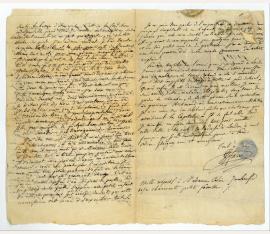French writer and revolutionary (1800-1830). 3 autograph letters signed. In French. [Naples], Gravesend, and Brest. 4to and 8vo. Altogether 6½ pp. on bifolia. With autograph addresses and traces of seals. Together with a manuscript attributed to the recipient of the letters, Alexandre Colin, and a letter to Colin concerning Farcy.
$ 3,736 / 3.500 €
(83062/BN54496)
Collection of three rare and insightful letters from Farcy’s correspondence with the painter Alexandre Colin, written during his extensive travels. The earliest letter was sent from Naples, towards the end of Farcy’s sojourn in Italy. He and Colin had been travelling together until Colin fell ill and was forced to return to Paris. After apologizing for not having written in a while and jokingly scolding his friend for the same negligence, Farcy assures Colin that he did not miss much in Sicily: "I believe that you, as a painter, do not need to have many regrets about leaving without having had time for this tour.
There is, in fact, complete nullity in terms of male costumes, extreme poverty among the women, and little beauty in general. It would have been better for you to see the peasants of the Abruzzi who now abound in Naples with their goatskin bagpipes" (1 Oct. 1827). - The second letter was written aboard the brig "George & Mary" in Gravesend, ahead of Farcy’s crossing to Brazil: "before parting to go I know not where and to return I know not when, at least I want to bid my final adieux from the bottom of my cabin" (2 June 1828). Farcy gives a bitter assessment of his two-month stay in London: "Among this vain and disdainful people one must present oneself with advantages at least equal to those they possess. I have never felt a greater need to be wealthy. This is the indispensable condition for living here, at least if one lives in London. Otherwise you just vegetate, or rather dry up on your feet. I admired London, I considered it the most beautiful and the most powerful city in the universe. But to me it has been nothing but a magnificent prison". For Farcy, London compares very unfavourably to Italy in terms of inhabitants, climate, and cost of living. But, as a true romantic, he also deplores that he and Colin could not see Italy "for the first time" again. In closing, Farcy mentions a visit to the studio of a painter and printmaker called West, probably Raphael Lamar West (1766-1850), who "appeared to be very touched by your memory". Alexandre Colin had spent several months in London in 1825 and participated in several exhibitions between 1829 and 1851. Apparently Colin wanted West to participate in his upcoming exhibition at the Royal Academy but, according to Farcy, he "had not painted anything for the exhibition". - In April 1829 Farcy returned from Brazil to France even more disillusioned than when he had left London. Writing Colins from Brest in order to announce his return and to ask his friend a favour, he makes a bleak statement about the journey and describes his final itinerary to Paris via the Loire valley: "I have returned once more but after a trip without pleasure or any advantage. In a few days I will be in Paris and I promise myself to see you again among the first [...] I expect to stop in Nantes, Tours, and Blois, and your letter will have time to reach me at that village [...]" (Brest, 22 April [1829]). - Jean-Georges Farcy studied philosophy at the École normale de la rue d’Ulm under Victor Cousin and Théodore Jouffry. When the school was shut down in 1822 because of its liberal agenda, Farcy started work as a private instructor. He found employment with the Russian aristocrat Madame Narischkin, who is mentioned in the letter from Naples. In 1826 Farcy started his restless travels, first heading south to Italy. After a short return to Paris in 1828 he went to London. Being unable to gain access to British society and utterly disappointed, Farcy embarked for Brazil. He only spent a few months in Rio de Janeiro before returning to France for lack of possibilities. Jean-Georges Farcy’s final adventure took place in Paris, as he participated in the July Revolution of 1830. He died on the third day of the successful insurrection against King Charles X, fighting alongside his friend Émile Littré. - The manuscript is a tribute to Farcy written on the occasion of the first anniversary of his death. The author of the emotional text states that he was in London when the news of Farcy's "glorious end" reached him. This agrees well with the biography of Alexandre Colin, who had an exhibition at the British Institute that year. - The letter to Colin by J.-M. Dargaud is a request for a copy of one of Colin's portraits of Farcy. Dargaud calls Farcy his "old friend" and explains that the portrait he used to have, probably a lithograph, was torn from his copy of the "Reliquae", Farcy's only (and posthumous) monograph. Colin portrayed his friend at least twice; the posthumous second portrait shows Farcy as a revolutionary. Both oil paintings are in the collection of the Musée Carnavalet. Three pencil sketches on the back of the letter are probably from Colin’s hand. - All letters with traces of folds and tears from breaking the seal. The letter from Gravesend somewhat brittle and with a restored tear affecting the text; the letter from Naples with minimal foxing and a restored tear; the letter from Brest with two restored tears. Manuscript with several minor tears and restorations. The letter to Colins with traces of folds, restored tears and stains..
